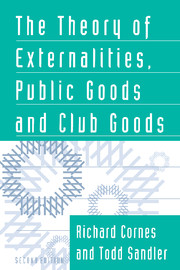Book contents
- Frontmatter
- Contents
- List of tables and figures
- Preface
- Part I Introduction to the theory of externalities, public goods, and club goods
- Part II Externalities
- 3 Theory of externalities
- 4 Externalities, equilibrium, and optimality
- 5 Externalities and private information
- Part III Public goods
- Part IV Clubs and club goods
- Part V Applications and future directions
- References
- Author index
- Subject index
5 - Externalities and private information
Published online by Cambridge University Press: 05 June 2012
- Frontmatter
- Contents
- List of tables and figures
- Preface
- Part I Introduction to the theory of externalities, public goods, and club goods
- Part II Externalities
- 3 Theory of externalities
- 4 Externalities, equilibrium, and optimality
- 5 Externalities and private information
- Part III Public goods
- Part IV Clubs and club goods
- Part V Applications and future directions
- References
- Author index
- Subject index
Summary
The analysis in Chapter 4 suggests that in a world of zero transaction costs, where participants in an exchange know the relevant characteristics of each other's preferences, technology, and endowments, mutually advantageous bargaining opportunities will not be ignored. The individuals may be expected to agree on a Pareto-efficient allocation. The traditional Pigouvian tax/subsidy literature, by contrast, assumes at the outset that equilibrium outcomes may indeed be inefficient. In particular, it presupposes that existing markets will not function in such a way as to eliminate all potential sources of inefficiency and that the introduction of taxes and subsidies into a market system can help by confronting individuals with those costs and benefits that their consumption and production activities generate for other parties and that are not internalized by the market mechanism. In order to justify the possibility of inefficiency in equilibrium, we need to examine more closely the idea of positive transaction costs. We hinted earlier that one way of thinking about such costs is to see them as arising from the presence of private information. Participants in an exchange may know their own preferences, endowments, and technology but may not be so well informed about the relevant characteristics of other potential participants. In analyzing the bargaining process that leads to an equilibrium, it is important to consider carefully the precise nature of the process, the information available to each party, and the implications of such matters for the properties of the equilibrium.
- Type
- Chapter
- Information
- The Theory of Externalities, Public Goods, and Club Goods , pp. 102 - 140Publisher: Cambridge University PressPrint publication year: 1996



